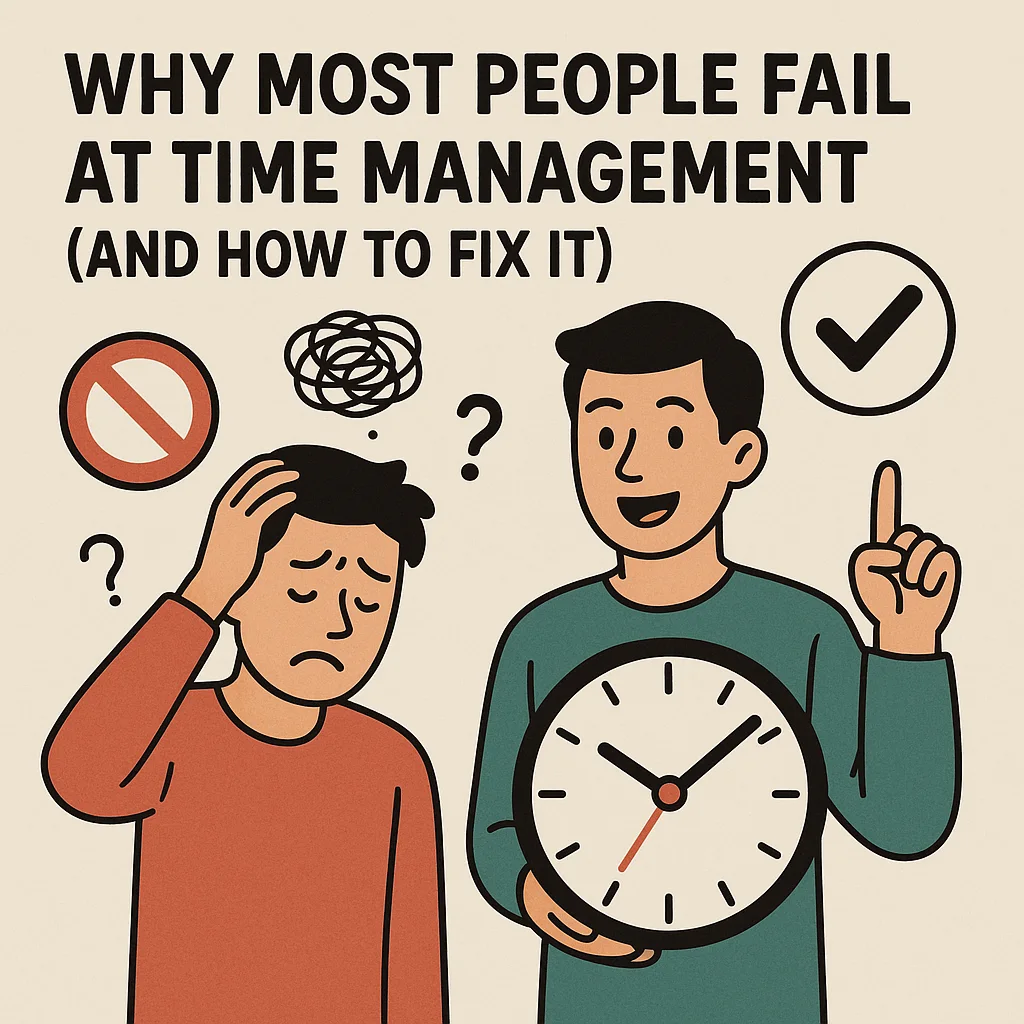Since everyone has access to time around the clock, it is the most democratic resource we possess. Others, however, battle chronic stress, procrastination, and burnout, while others appear to be adept at managing their calendars, crossing tasks off to-do lists, and still finding time for relaxation. Why do the majority of people struggle with time management? More importantly, what can be done to fix it?
In this blog, we'll examine the psychology and science underlying ineffective time management, dispel common misconceptions, and provide you with doable, empirically supported methods to ultimately take charge of your life and schedule.
Why Time Management Is Hard for Most People
Let's begin by comprehending the underlying reasons. Ineffective time management involves psychology, biology, and systems in addition to laziness.
1. We Rely Too Much on Willpower
Most people believe time management is simply about discipline. But willpower is a finite resource.
According to research by psychologist Roy Baumeister, decision fatigue, or the mental tiredness brought on by making too many decisions, impairs your capacity to make wise time decisions throughout the day.
Fix: Build systems, not goals. Automate routines, batch tasks, and use checklists to reduce decision-making overhead.
2. We Underestimate How Long Tasks Take
The planning fallacy is a cognitive bias in which we routinely underestimate the amount of time required to finish tasks in the future.
That blog post takes two hours to complete, even though you only expected it to take thirty. Your schedule is ruined when you multiply this by the number of hours in a day.
Fix: Start tracking time with tools like Toggl or Clockify. Use past data to create realistic time estimates.
3. We Confuse Being Busy with Being Productive
You are not necessarily being effective just because you are responding to emails or going to meetings. Many people spend time on low-impact activities rather than the things that truly matter, a phenomenon known as the "urgency trap."
Fix: Use the Eisenhower Matrix to separate urgent tasks from important ones. Prioritize deep work over shallow work.
4. We Let Distractions Control Us
Distractions abound in the modern world, including phone notifications, social media, email, and Slack. These disruptions break up your focus and make it very difficult to get into a flow.
Fix: Practice time-blocking. Turn off notifications, use focus tools like Freedom or Cold Turkey, and block out time for distraction-free work.
5. We Don’t Align Tasks with Energy Levels
Many people plan their most difficult tasks for when they are least motivated, such as late in the afternoon. Poor outcomes and procrastination result from this.
Fix: Learn your chronotype (morning bird, night owl, etc.). Do high-focus tasks during your peak energy window and administrative work during your dips.
6. We Have No Clarity on Long-Term Goals
It's simple to pack your calendar with busywork if you don't have a clear plan. Without a purpose, time management is just a way to get things done quickly.
Fix: Set long-term goals, then reverse-engineer them into weekly and daily tasks. Use frameworks like OKRs (Objectives and Key Results) or 12-Week Year planning.
Common Myths About Time Management
To truly improve, we need to dispel a few popular misconceptions:
❌ Myth #1: You Need to Wake Up at 5 AM to Be Successful
Early mornings aren't for everyone. Productivity is more about how you use your working hours than it is about when you work.
Truth: Find your peak productivity windows and build your routine around them, not around other people’s habits.
❌ Myth #2: Multitasking Saves Time
Although it may make you feel more productive, multitasking impairs cognitive function and raises the likelihood of mistakes.
Truth: Focus on one thing at a time. Use techniques like Pomodoro (25-minute focus sprints) or Deep Work blocks.
❌ Myth #3: The More Tools, the Better
It may not be beneficial to have ten productivity apps. Instead of working on the task at hand, you squander time updating or switching between them.
Truth: Keep it simple. Use only the tools that integrate well with your workflow and reduce friction.
How to Actually Fix Your Time Management (Step-by-Step)
Let’s break down a practical, science-backed framework you can start using today.
🔹 Step 1: Audit Your Time
Before changing anything, understand how you currently spend your time.
-
Use a time-tracking tool (like RescueTime or Toggl) for 3–7 days.
-
Categorize activities: deep work, admin, meetings, leisure, etc.
-
Identify time drains (e.g., social media scrolling, excessive meetings).
This audit will often shock you—and it’s the first step toward change.
🔹 Step 2: Define Your Priorities
Ask yourself:
-
What are my top 3 long-term goals?
-
What actions drive the most results?
-
What tasks can I eliminate or delegate?
Apply the 80/20 rule, or Pareto Principle: 20% of your efforts yield 80% of the results. Concentrate on those important tasks.
🔹 Step 3: Plan Your Week and Day
Use a weekly review every Sunday:
-
Look at upcoming deadlines and appointments.
-
Set 3–5 major goals for the week.
-
Block out time in your calendar for deep work.
Then, use a daily planning ritual:
-
Review your top priorities.
-
Choose 1–3 “must-do” tasks (MITs).
-
Reflect at day’s end: What worked? What didn’t?
🔹 Step 4: Build Routines and Habits
Good time managers rely on habit loops, not motivation. Create routines for:
-
Morning startup
-
Deep work
-
Breaks and meals
-
Shutdown ritual at day’s end
Use tools like Habitica or Streaks to build consistency.
🔹 Step 5: Reflect and Improve Weekly
At the end of each week, ask:
-
What did I accomplish?
-
What derailed me?
-
What can I do better next week?
This reflection helps you iterate, refine your workflow, and avoid repeating mistakes.
Bonus: Tools That Actually Help
Here are a few proven tools to support your time management:
-
Notion – All-in-one workspace for planning, writing, and tracking tasks
-
Todoist – Simple and effective task manager
-
Google Calendar – For scheduling and time-blocking
-
Toggl Track – Time tracking with reports
-
RescueTime – Automatic time audit and distraction analysis
-
Focusmate – Virtual coworking for accountability
Final Thoughts
Time management isn’t just about cramming more into your day—it’s about making room for what matters most.
Most people fail at managing their time because they:
-
Rely on willpower
-
Work against their biology
-
Don’t track their time
-
Confuse busyness with effectiveness
-
Lack purpose
But you can take back your time if you have the correct attitude, resources, and routines. Begin with deliberate, modest adjustments. Get things moving. Think a lot. Additionally, keep in mind that effective time management truly comes down to controlling your focus, vitality, and intention.
Time isn’t money—it’s life. Spend it wisely.



